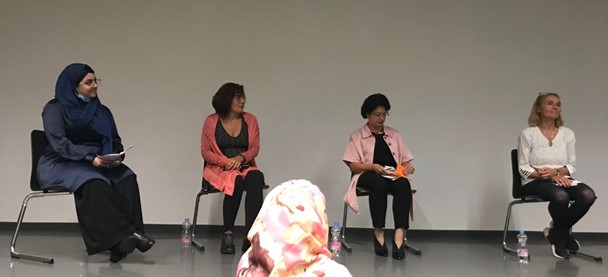The European Union treats refugees on its borders as if they are bombs, says activist and co-founder of Lesvos Solidarity, Efi Latsoudi.
Article by Rida Fatima Memon
Efi Latsoudi, the winner of Women Rebels Against War – Anita Augspurg Prize – was referring to the migration crisis in Greece at a talk organised by the Women’s International League for Peace and Freedom (WILPF) and the Journalism Department of Universität Hamburg on September 11, 2021. The discussion titled ‘At the EU Borders: Greek Activist Efi Latsoudi on Human Dignity and Solidarity from Lesbos to Hamburg’, focused on how the migration crisis and the migrants are viewed by the media and in narratives pushed by the EU member states.
Latsoudi says the enemy narrative reserved for refugees is not only popular in government circles, but also in the media. She says the idea being portrayed is that “we are fighting enemies, we are facing enemies, and we are pushing back enemies.”
Latsoudi is a Greek psychologist and co-founded Pikpa Camp in 2012, with the aim to provide shelter to vulnerable refugees, such as pregnant women, traumatised women and children, people with special needs, LGBTQI persons, stranded in Lesbos. But in October 2020, the camp, which has until that time been helping around 30,000 people, was forcibly shut down by the Greek authorities.
“There is such a lack of a system of reception and protection and access to asylum and immigration plan,” says Latsoudi. “Nothing is in place and nothing is going to be in place by this government because they are against refugees.”
According to Latsoudi, what is happening in Greece is very political in nature where refugees are being used basically as a tool for being elected. She adds: “This was the basic narrative that when we will be elected, Moria [the refugee camp] will not be there, they [refugees] will be returned, deported. They will be stopped, the problem will be resolved.”
She recalled the incident from September 2020, when a fire broke out in the Moria refugee camp – located near Mytilene on the island of Lesbos – leaving around 13,000 refugees vulnerable and without shelter. She mentioned that when the riot police arrived to control the situation, they destroyed the existing camps and prevented the creation of others. Latsoudi adds that the Moria fire incident tells us that one cannot put the blame on refugees. “When you have people living in such conditions, they feel overwhelmed and scared. Moria was a nightmare. There was so much violence and so much stress. It is easy to say it is their fault. But it is not.”
According to Latsoudi politicians and media play a role in creating racist narratives about refugees.
She says this leads to popular anger which is reflected when locals elect politicians who make promises to send back refugees or to take down their camps. “The refugees are treated like enemies with efforts made to push them back.”
She says the Greek government is against refugees and want them to disappear, and laments that proper steps are not being taken to address the situation in a manner that upholds the dignity of refugees. “The conditions in which these people live are not acceptable. It is an issue of human rights,” she says.
‘EU involved in pushbacks’
Barbara Lochbihler, a former member of the European Union (EU) parliament, was also part of the panel. Discussing the role of the EU in the refugee crisis in the 27-member states, she says that the EU has militarised its borders and is involved in pushing back people.
“Frontex [the European Border and Coast Guard Agency] civil servants, together with Greek coastal guards, were involved in pushing back people,” she points out, criticising the EU’s migration and asylum policy. She says that the bloc continues to portray itself as the victim of the migration crisis.
“The EU institutions believe they are threatened by smugglers and traffickers. Therefore, they argue that they have to invest more money to protect the refugees as well in order to prevent them from becoming the victims of the traffickers.
However, according to her, the reality is far from their claims and none of the funds acquired were spent for the protection of refugees.
Lochbihler also pointed out a contradiction between the claims made by the EU to protect human rights and what it actually practiced. She shed light on the use of inhumane practices, such as the torture equipment ‘Sound Cannons’ used frequently by Frontex to prevent migratory dinghies from entering Europe.
“In the new leadership of the commission, there is no political will to implement what was promised at the beginning with priority to adopt a new asylum and migration policy,” she says.
Another panelist, Julia Fischer-Ortmann, who is a psychologist by profession and works with traumatised refugees, described the work being done to support refugees in Hamburg, Germany.
Fischer-Ortman works with Centra – Coordinating Centre for Traumatised Refugees, which is a part of the Psychosocial Centre of the University Medical Center Hamburg-Eppendorf (UKE). She says the refugees have already been under a lot of trauma after facing immense tragedies and that their hardships do not end after reaching to safety as their futures remain uncertain.
She stresses on the importance of therapy and how it can help traumatised refugees move past their past. “Therapy has to be done very carefully in these sensitive situations,” she says. “Even speaking about the past can lead to ‘retraumatization’.” Overall, the panelists agree that efforts are needed on all levels, individual, governmental and societal to help integrate the refugees and protect their rights.

